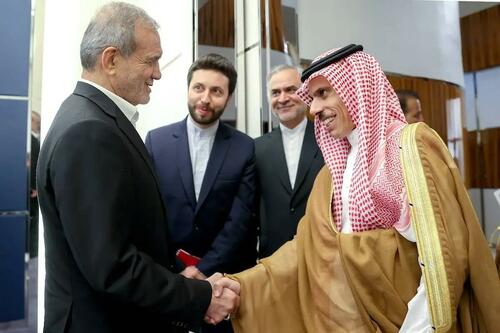
The world's largest oil exporter Saudi Arabia says that it is staying neutral and on the sidelines when it comes to the ratcheting wars in Lebanon, Gaza, and Yemen - and the Iran vs. Israel showdown.
Other members of the Gulf Cooperation Council (GCC) - which includes Qatar, the United Arab Emirates, Bahrain, Oman, and Kuwait - have also this week "sought to reassure Iran of their neutrality" in the Iran-Israel conflict, Reuters has reported.

Prior to the Gaza war, Saudi Arabia was widely seen as on the cusp of signing a full normalization and diplomatic relations deal with Israel, as part of the Abraham Accords - but that was derailed in the wake of Oct.7.
At the same time, Riyadh and Tehran have recently made peace. The kingdom is now seeking to assure Iran it will not join Israel's side.
The Saudis and other GGC states wish to avoid the kind of attacks which could impact its oil production and exports, such as the 2019 Abqaiq–Khurais Saudi Aramco drones strikes. The US blamed Iran for those historic attacks, but Tehran leaders never owned up to it.
Iranian President Masoud Pezeshkian has been in Doha this week. He told Saudi Foreign Minister Faisal bin Farhan on Thursday, "We consider Islamic countries, including Saudi Arabia, as our brothers, and we emphasize the importance of setting aside differences to enhance cooperation."
Bin Farhan also expressed the desire to set aside all rifts. "We aim to permanently close the chapter on our differences and focus on resolving issues, developing relations as two friendly and brotherly countries," he said, as cited in Iranian state media.
Regional tensions are soaring, and global oil markets have been reacting with each big headline and statement related to reports that Israel could be preparing major strikes on Iran's oil and gas fields.
As for the latest Friday afternoon, which sent oil sliding...
President Biden asked Friday for clarification on his Thursday’s comment about potential Israeli strikes on Iranian oil facilities:
— Javier Blas (@JavierBlas) October 4, 2024
“I think if I were in their shoes, I’d be thinking about other alternatives than striking oil fields.”#OOTT
More broadly, things between the Gulf states and Iran began cooling in the wake of the decade-long proxy war in Syria to oust Assad. The GCC countries were active in funding jihadist rebels seeking to conquer Damascus (and to counter the Iranian/Shia axis), but once it became clear that the Syrian government emerged victorious, GCC diplomats began racing back to Damascus.
The world’s largest oil exporter Saudi Arabia says that it is staying neutral and on the sidelines when it comes to the ratcheting wars in Lebanon, Gaza, and Yemen – and the Iran vs. Israel showdown.
Other members of the Gulf Cooperation Council (GCC) – which includes Qatar, the United Arab Emirates, Bahrain, Oman, and Kuwait – have also this week “sought to reassure Iran of their neutrality” in the Iran-Israel conflict, Reuters has reported.

Prior to the Gaza war, Saudi Arabia was widely seen as on the cusp of signing a full normalization and diplomatic relations deal with Israel, as part of the Abraham Accords – but that was derailed in the wake of Oct.7.
At the same time, Riyadh and Tehran have recently made peace. The kingdom is now seeking to assure Iran it will not join Israel’s side.
The Saudis and other GGC states wish to avoid the kind of attacks which could impact its oil production and exports, such as the 2019 Abqaiq–Khurais Saudi Aramco drones strikes. The US blamed Iran for those historic attacks, but Tehran leaders never owned up to it.
Iranian President Masoud Pezeshkian has been in Doha this week. He told Saudi Foreign Minister Faisal bin Farhan on Thursday, “We consider Islamic countries, including Saudi Arabia, as our brothers, and we emphasize the importance of setting aside differences to enhance cooperation.”
Bin Farhan also expressed the desire to set aside all rifts. “We aim to permanently close the chapter on our differences and focus on resolving issues, developing relations as two friendly and brotherly countries,” he said, as cited in Iranian state media.
Regional tensions are soaring, and global oil markets have been reacting with each big headline and statement related to reports that Israel could be preparing major strikes on Iran’s oil and gas fields.
As for the latest Friday afternoon, which sent oil sliding…
President Biden asked Friday for clarification on his Thursday’s comment about potential Israeli strikes on Iranian oil facilities:
“I think if I were in their shoes, I’d be thinking about other alternatives than striking oil fields.”#OOTT
— Javier Blas (@JavierBlas) October 4, 2024
More broadly, things between the Gulf states and Iran began cooling in the wake of the decade-long proxy war in Syria to oust Assad. The GCC countries were active in funding jihadist rebels seeking to conquer Damascus (and to counter the Iranian/Shia axis), but once it became clear that the Syrian government emerged victorious, GCC diplomats began racing back to Damascus.
Loading…



